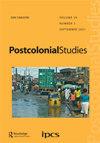Anticolonial poetics: forging solidarities and imagining futures
IF 1.8
3区 社会学
Q2 CULTURAL STUDIES
引用次数: 0
Abstract
ABSTRACT This paper explores the construction of affective solidarities within and across the spaces and boundaries of colonized and racialized worlds in the works of militant poets of the Portuguese colonies in Africa. From the 1940s to the 1960s a distinct form of anticolonial poetry emerged written by a generation of Angolans and Mozambicans who became involved in the liberation struggles. The paper examines how poetry served as a vehicle to imagine and call into being various subjectivities and affective relations which actively countered the restrictions of colonialism and racism, especially on the part of the assimilados, the small educated elite constructed by Portuguese colonialism. Several important forms of anticolonial connectivity are expressed in these poems: connections with the broader African diaspora in North America, the Caribbean and Brazil; connections with all continental Africans; connections across the spaces of the Portuguese colonial empire – Angola, Mozambique, Guinea-Bissau, Cabo Verde, São Tomé and Príncipe; and connections of solidarity and unity between the assimilados and indígenas of the Portuguese colonies. These various dimensions of affective connection were constitutive of a new anticolonial imagination and looked towards liberated futures.反殖民诗学:锻造团结与想象未来
摘要:本文探讨了葡萄牙在非洲殖民地的好战诗人作品中,在殖民地和种族化世界的空间和边界内和跨空间和边界的情感团结的构建。从20世纪40年代到60年代,参与解放斗争的一代安哥拉人和莫桑比克人创作了一种独特的反殖民主义诗歌。本文考察了诗歌是如何作为一种媒介来想象和唤起各种主体性和情感关系,这些主体性和情感关系积极地对抗殖民主义和种族主义的限制,特别是对同化者来说,葡萄牙殖民主义构建的少数受过教育的精英。这些诗歌表达了反殖民主义联系的几种重要形式:与北美、加勒比和巴西更广泛的非洲侨民的联系;与所有非洲大陆的联系;葡萄牙殖民帝国的各个空间之间的联系——安哥拉、莫桑比克、几内亚比绍、佛得角、奥汤玛斯和Príncipe;以及葡萄牙殖民地的同化者和indígenas之间的团结和统一的联系。这些不同维度的情感联系构成了一种新的反殖民想象,并展望了解放的未来。
本文章由计算机程序翻译,如有差异,请以英文原文为准。
求助全文
约1分钟内获得全文
求助全文

 求助内容:
求助内容: 应助结果提醒方式:
应助结果提醒方式:


